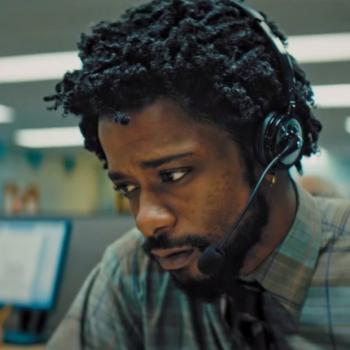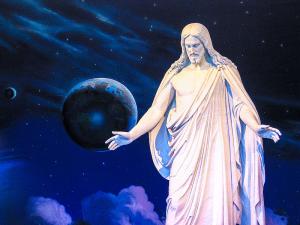2013 is the 20th anniversary of Tony Kushner’s Pulitzer Prize for his groundbreaking play Angels in America, which first appeared on Broadway in two-parts in 1993. Kushner’s sweeping epic critiqued conservative politics in Reagan-era America and confronted the devastating realities of HIV-AIDS for the gay community. Along the way, Angels engaged with a variety of American identities, cultures, and issues, many of which are grounded in religion and spirituality. In addition to the obvious religious implications of the play’s millennial themes and of the Angel of America herself, main character Prior is identified as a New England WASP; Louis, Roy Cohn, and Ethel Rosenberg bring Judaism to the fore; Belize is a black former drag queen; Joe Pitt and his family struggle with what it means to be Mormon; and all of the play’s major characters struggle to reconcile sexual and religious identities.
Here on Peculiar People, Cristine Hutchison-Jones, author of “Center and Periphery: Mormons and American Culture in Tony Kushner’s Angels in America” (2010), and Matthew Bowman, author of The Mormon People: The Making of an American Faith (2011), mark the occasion by reflecting on what Kushner’s representations of Latter-day Saints and their beliefs demonstrate about Mormons, Mormonism, and how non-Mormon Americans view the LDS community.
CHJ: So, Matt, I was reading over the paper that you presented last year at the Mormon History Association annual conference comparing the musical The Book of Mormon and Angels in America – which is the reason we met, by the way, because I showed up to hear your presentation. I was struck then and I’m struck now by the fact that, despite your initial praise for the greater complexity of Kushner’s Mormon characters, in the end you seem to condemn Kushner for writing flat and stereotypical representations of contemporary Latter-day Saints who are “the musical’s bright-eyed missionaries in negative, afflicted with the same conventions but lacking any sense of naïve idealism.” Am I reading you right?
MB: Oh dear, I certainly hope that I’m not saying that! I actually think that what Kushner’s doing is calling out Mormons – and by extension , all Americans – who themselves have bought into that stereotype: Mormons who believe that to be a good Mormon is to be a conventional participant in the culture of American capitalism, and other Americans who sneer at religions that offer apparently strange (but potentially dynamic) utopias and instead turn back to the essentially soul-sucking world of unfettered moneymaking and pleasure-seeking. I think Kushner’s sad about the Pitts, because their Mormonism gives them a way out of that world and they don’t understand it. That is, insofar as the Pitts are conventional, it’s not because Kushner’s buying into stereotypes; it’s because he’s using the stereotype to make a point: Mormons are boring, but that’s a bad thing, and perhaps a betrayal of their own identity.
CHJ: I have to push you a little further on this point and disagree with your assessment (in the paper at least) of some of Kushner’s Mormon characters. For instance, you call repressed homosexual Joe Pitt’s wife “a stereotypical Mormon housewife” – but where are the kids, the Jell-O, and the endless church commitments? Rather, isn’t he trying to demonstrate that the stereotypes themselves are wrong and are just masking the damage that a certain type of conservative (in this case Mormon) repression does to people?
MB: Lots of Mormons have various quibbles with Kushner’s depiction of the church. The most important and useful of these is that one along the lines that you mention: that is, the Pitts appear to have no friends, whereas in actual real life they’d have had a dozen Mormons from their congregation knocking on their door within three days of moving to New York; this is a useful critique, I think, because Kushner either 1) is trying to make a point by emphasizing the Pitts’ isolation, or 2) could have used the strong bonds of Mormon community to get at his themes. But what Kushner gets profoundly right is how easily Mormons imagine themselves as being basically American, and how depressing that can be.
As to Harper, it’s my impression that her isolation serves a dramatic purpose: it facilitates and furthers her character arc. And it’s important, I think, that she does eventually find solace and community in her Mormon past – particularly, the Mormon mother animatronic.
CHJ: You say more than once that Kushner views Mormonism as symbolic of America, in one case arguing that he sees in Mormonism “what [America] might have been and what it is struggling toward.” You also note numerous times the many tools for community-building to be found in Mormon theology and culture. What do you see as the connection?
MB: I think Kushner’s using Mormonism as a proxy for a lot of marginal groups in America – Jews and the gay community, most particularly. The things which he admires about Mormonism have less to do with any particular social issue or doctrinal stance and more to do with worldview, most particularly, the possibility of the radical transformation of community driven by moral imperatives, the willingness to bear up under persecution in pursuit of those moral imperatives, and, perhaps, the aesthetic nature of a prophetic religion in a blandly technocratic society. That Kushner gives Prior Walter a mirror of Joseph Smith’s first visionary experience makes the comparison explicit.
CHJ: I think you’re absolutely right that Kushner views the Pitts’ understanding of Mormonism – and Louis’s Judaism, too – as a betrayal of the possibilities for radical reform inherent in their religion. In interviews he speaks with great admiration of early Mormonism’s challenges to American sexual, political, and economic norms. In the play’s Epilogue he creates an ideal community that adopts some things you could see as early Mormon – angelic visions, a priesthood of all believers, mutual support. But he also calls for changes that seem utterly un-Mormon – beginning with the fact that the clear spiritual center of this new community is a woman who the play hints is a lesbian, and the community is founded on an embrace of the differences – particularly gender and sexuality – among its members. So what, then, is the takeaway on Mormonism here? (For the record, I think it’s a positive one: angelic visions remain central to Kushner’s ideal community, and the person who shared that vision with the others and seems set to lead them forward brought that vision out of her Mormonism.)
MB: Yes, I think this is right, and it sharpens a point I made before: that the appeal of Mormonism to Kushner is aesthetic and archetypical rather than it is about any particular principle or moral point. He likes Mormonism because Mormon history and the Mormon narrative is so vividly prophetic, and he’s distressed that it appears to have departed so far from that inheritance. That’s what makes the Pitts depressing – but the other major Mormon character, Joe’s mother Hannah – so interesting.
CHJ: For me, Hannah is the key to understanding Kushner’s take on Mormonism. As I noted above, she ends up as the leader of Kushner’s ideal community, and she puts her Mormon vision squarely at the center of that community. The entire Epilogue is, in fact, a retelling by each of the characters of the story of the angel Bethesda – a story that they each tell in their own voices based on a story originally shared with them by Hannah. In the end, I don’t think Kushner is simply attacking Mormonism (or Judaism, or religion in general). Rather, I think he’s condemning the institutionalization of religion that turns radical communities bent on challenging the status quo into the status quo. Kushner doesn’t look anti-Mormon to me, or even, necessarily, anti-religion (despite his personal atheism). He’s anti-institution.
MB: I think you’re mostly right here, but I’d use a different vector: Weber’s classic prophet/priest trajectory. Kushner likes prophetic Mormonism but dislikes priestly Mormonism, and Hannah’s his attempt to turn back the dial and to restore the prophetic. It’s a beautifully done feat, but of course as you point out all radical movements do eventually become the status quo, all movements do become institutions, which leaves me wondering a bit where Kushner would go from here. He does have some thoughts about restlessness and change and so on, but I sometimes wonder how sustainable that is.
CHJ: I think what finally intrigues me most about Kushner’s engagement of Mormonism in Angels is his overt proposal that believing in Joseph Smith and his angels is fine but that stereotypical contemporary Mormon social and political conservatism need to be revised. As a non-Mormon observer of the Latter-day Saints, I’m left wondering what role outsiders have to play in defining and redefining Mormonism.
MB: That’s an interesting point – I think your first sentence summary of Kushner’s position is spot-on, but I’d push it a bit further: rather, I’d say that Kushner is saying that the stereotypical conservatism is not fundamentally what Mormonism is about, and that’s a useful thing for Mormons to hear. The great plague of American public discourse about religion today is that religion is often taken as merely a proxy for various political positions, and I think Kushner’s making a more profound point than “I wish Mormons were OK with gay marriage.” Rather, he’s telling us that the worldviews that religions have to offer go beyond American party politics, and to the extent that any religion forgets that, they’ve abandoned their prophetic heritage.
I’d be interested in hearing from commentators or other Patheos writers on these questions: does Kushner’s depiction of Mormonism seem particularly relevant to how members of other faith traditions understand their own place in America? Does his depiction of Mormons seem accurate to non-Mormons?
CHJ: I’d also like to hear what people think about Kushner’s treatments of his other chosen minorities in the play: gays and lesbians; Jews; African Americans. Do people think that his representations of those groups – especially Jews, the religious/ethnic minority to which he belongs – are more or less authentic than what he does with Mormons?
On a different note, I’d love to hear what people think about the translation from play to film. I’ve read the play many times, but never seen it performed. But for me, the play is far sharper and more incisive than the television movie (much as I LOVE Al Pacino as Roy Cohn!). Honestly, I was left feeling like he tamed it down for prime time TV. What do others who’ve read/seen the play and seen the movie think about the adaptation?











